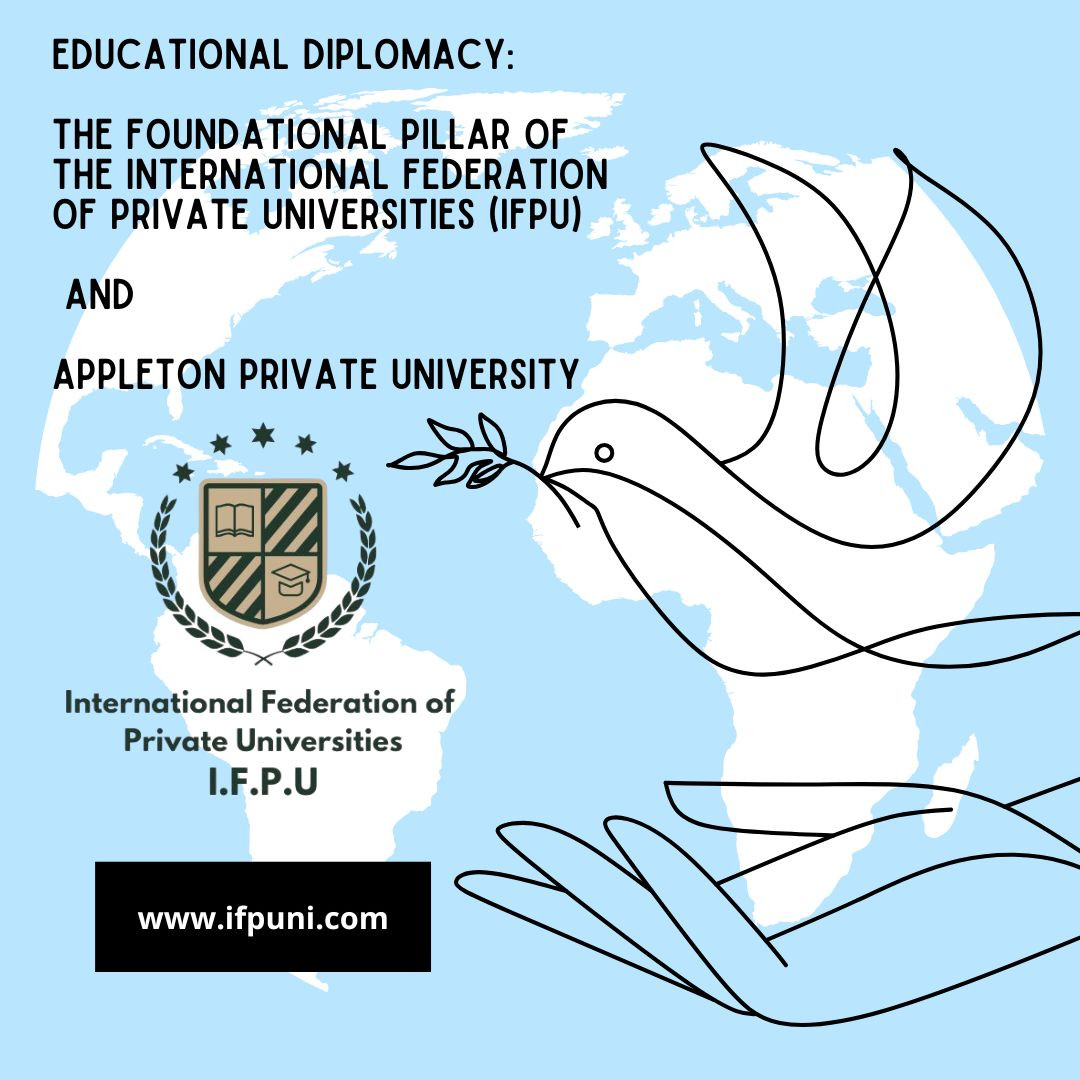Educational Diplomacy
In the global landscape of higher education, the International Federation of Private Universities (IFPU) and Appleton Private University (APU) stand as benchmarks of a new era, where educational diplomacy becomes the fundamental pillar of their mission and vision. This innovative approach transcends the traditional boundaries of academia, forging bridges between cultures, nations, and educational systems, with the goal of building a more inclusive and prosperous future for all.
Educational Diplomacy: A Transformative Concept
Educational diplomacy, in its essence, is a strategic process that uses education as a tool to foster mutual understanding, cooperation, and sustainable development among nations. It is based on the premise that education is not only an individual right but also a global public good, capable of promoting peace, justice, and prosperity.
In the context of the IFPU and APU, educational diplomacy manifests in various dimensions:
- Academic and Cultural Exchange: Facilitating the exchange of students, professors, and researchers between institutions in different countries, enriching learning and fostering intercultural understanding.
- International Cooperation: Establishing strategic alliances with universities, organizations, and governments around the world to develop joint educational programs, collaborative research projects, and community outreach activities.
- Promotion of Global Education: Advocating for the importance of education as a driver of sustainable development, promoting equity, inclusion, and quality in higher education globally.
- Intercultural Dialogue: Creating spaces for dialogue and debate on relevant global issues, fostering respect for cultural diversity and critical thinking.
The IFPU: A Global Cooperation Ecosystem
The International Federation of Private Universities (IFPU) has established itself as a dynamic ecosystem of global cooperation, where private universities from around the world come together to share knowledge, resources, and best practices. The IFPU facilitates collaboration in key areas such as:
- Educational Innovation: Promoting the adoption of new technologies and teaching methodologies to improve the quality and relevance of higher education.
- Research and Development: Fostering interdisciplinary research and collaboration among researchers from different countries to address complex global challenges.
- Professional Development: Offering training and professional development programs for professors and administrative staff to improve their skills and competencies.
- Student Mobility: Facilitating student exchange between member universities to promote curriculum internationalization and cultural diversity.
Appleton Private University: A Model of Educational Diplomacy in Action
Appleton Private University (APU) has become a benchmark for educational diplomacy in action, implementing innovative strategies to foster international cooperation and intercultural understanding. Some of its notable initiatives include:
- Dual Degree Programs: Offering dual degree programs in collaboration with universities from different countries, allowing students to obtain internationally recognized degrees.
- UNESCO Chairs: Establishing UNESCO Chairs in key areas such as education for sustainable development and intercultural dialogue to promote research and dissemination in these subjects.
- Collaborative Research Projects: Participating in collaborative research projects with international universities and organizations to address global challenges such as climate change, poverty, and inequality.
- Community Outreach Activities: Organizing community outreach activities in collaboration with local and international partners to promote social and economic development in vulnerable communities.
The Impact of Educational Diplomacy
The impact of the educational diplomacy driven by the IFPU and APU extends far beyond the borders of their campuses. By fostering international cooperation and intercultural understanding, they are contributing to:
- Building a More Peaceful World: Promoting dialogue and cooperation between nations, reducing the likelihood of conflicts and fostering peace.
- Promoting Sustainable Development: Addressing global challenges such as climate change, poverty, and inequality through research, education, and community action.
- Strengthening Democracy and Human Rights: Promoting education in human rights and global citizenship, fostering respect for diversity and citizen participation.
- Driving Innovation and Progress: Facilitating the exchange of knowledge and technologies, driving innovation and progress in various fields.
Challenges and Opportunities
Despite the achievements, the IFPU and APU face significant challenges in their mission to promote educational diplomacy. Some of these challenges include:
- Overcoming Linguistic and Cultural Barriers: Facilitating communication and collaboration between people from different cultures and languages.
- Ensuring Equity and Inclusion: Ensuring that all students, regardless of their origin or condition, have access to quality education.
- Adapting to Technological Changes: Integrating new technologies into education to improve the quality and accessibility of learning.
- Mobilizing Resources: Obtaining the necessary funding to support research, education, and international cooperation.
However, there are also great opportunities to expand the impact of educational diplomacy. By leveraging new technologies, strengthening strategic alliances, and fostering the participation of civil society, the IFPU and APU can contribute to building a more prosperous and sustainable future for all.
Conclusion
Educational diplomacy is a transformative concept that has the power to build bridges between nations, cultures, and educational systems. The International Federation of Private Universities (IFPU) and Appleton Private University (APU) have become benchmarks of this innovative approach, demonstrating that education can be a powerful tool to promote peace, justice, and sustainable development. By continuing to foster international cooperation and intercultural understanding, they are contributing to building a more inclusive and prosperous world for all.

